When it comes to the end of the Universe, most physicists think it will gradually get colder and fade out of existence, at the earliest, 2.8 billion years from now.
But it might not be so simple. Calculations have shown that dark energy could cause the Universe to gradually tear itself apart until there's nothing left. And now a new study has provided a closer examination of what that fate might look like.
It's not the first time that this possibility of the Universe ripping itself apart has been put forward. Our current understanding of the Universe is that around 68 percent of its energy is dark energy - a mysterious force that's gradually accelerating the expansion of the Universe.
Based on that, the most popular hypothesis among scientists about how the Universe will end involves our galaxies and stars steadily moving further apart, until they're too distant and cold to interact anymore, and the Universe slowly dies.
That possibility is known as the 'Big Freeze', or the heat death of the Universe.
But over the past couple of decades, researchers have come up with another possibility. What if dark energy doesn't behave the way we expect it to? Instead of causing a steady expansion of the Universe, the expansion might accelerate over time, causing the Universe to eventually tear itself apart.
That scenario is called the 'Big Rip' and it would require dark energy to behave in a way we haven't seen as yet, and take on a form where it gets denser as the Universe expands.
But just because we've never seen dark energy do that before, doesn't mean we can rule it out, and so far, scientists haven't been able to prove that this fate isn't possible.
To get a better understanding of what that 'Big Rip' might look like, a team of researchers from the Technical University of Lisbon in Portugal has now studied three possible versions: the Big Rip; the Little Sibling of the Big Rip; and the Little Rip.
All of those options are pretty similar, but they differ slightly in the way things come apart. As the names suggest, the Big Rip involves the Universe tearing itself apart very abruptly, while the littler versions have things happening more gradually.
"What they have in common is that our galaxy, and all galaxies, would be ripped apart," one of the researchers, Mariam Bouhmadi-López told Rebecca Boyle from New Scientist. "Everything goes wrong."
In order to see which of these three scenarios was more likely, the team studied the latest map of the cosmos based on observations from the Wilkinson Microwave Anisotropy Probe and the Planck satellite.
What they were looking for were areas of the Universe with variations in gravity. In some parts of the Universe - such as our galaxies - dark matter and regular matter are more concentrated. This can lead to inconsistencies in gravity and could affect the rate at which dark energy acts.
By studying these clumps of matter, the team was able to get an idea of which type of rip the Universe might be headed for. Their verdict? The Little Rip, in which the Universe would slowly come apart.
Their results haven't been peer-reviewed as yet, so there's a lot more validation to be done before we take that prediction too seriously.
For now, this is just another possible scenario thrown out there for researchers to poke holes in with more data. And the paper is now available online at arXiv.org for other physicists to take a look at.
But what's most useful about this study, even if it turns out to be an incorrect prediction, is that the team has highlighted a bunch of things we can look for in future in order to get an idea of which fate our Universe is headed towards.
"They've been able to come up with some observational signatures that are different in these models, and in the future we will be able to use that," Robert Scherrer from Vanderbilt University, one of the scientists who originally came up with the Little Rip idea, but wasn't involved in this study, told New Scientist.
And the good news is that, even if the Universe does end by tearing itself apart, we've got a long time to prepare - or come up with new hypotheses. According to Boyle, the Little Rip scenario won't happen for another 100 billion years.
Just last month, researchers questioned the accelerating expansion of the Universe, so we still have a lot to learn - including figuring out what dark energy actually is. But it's only through new predictions like this one, and further testing and observations that we'll find out more.
You can read the full paper here.
